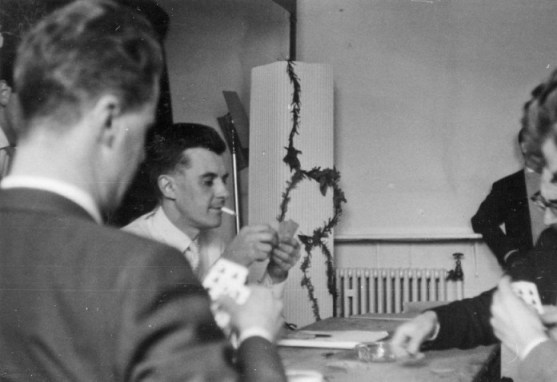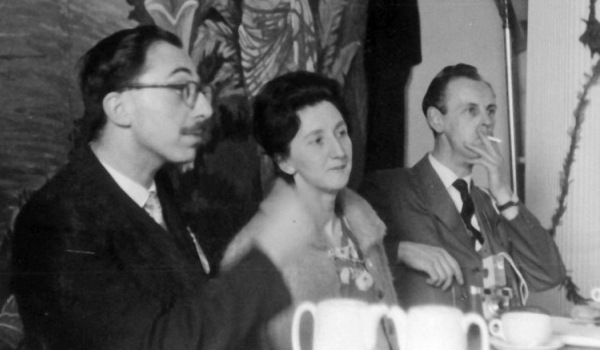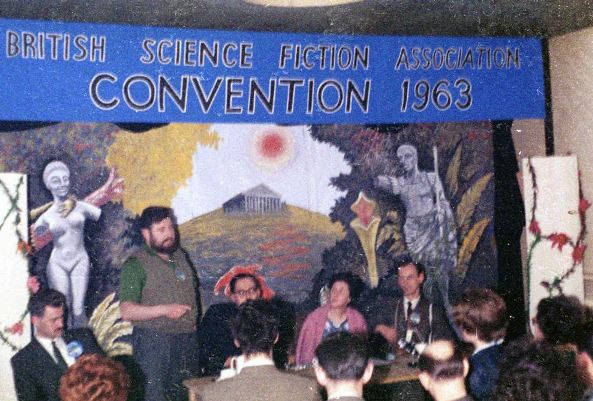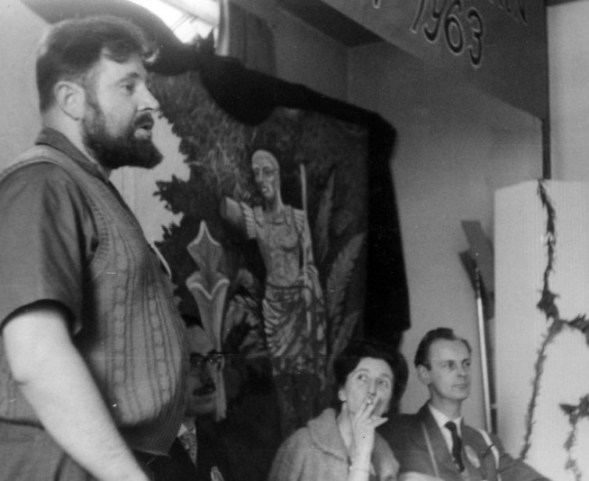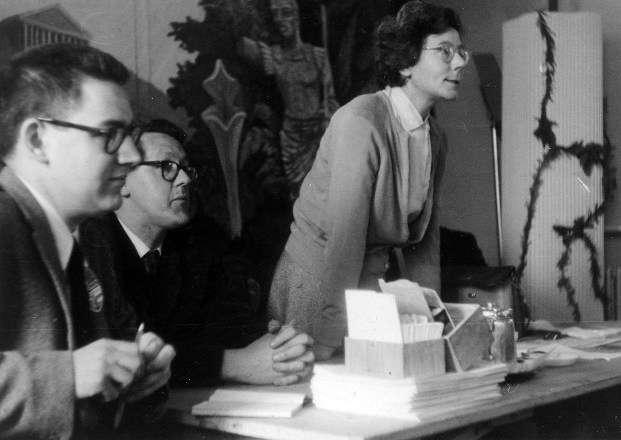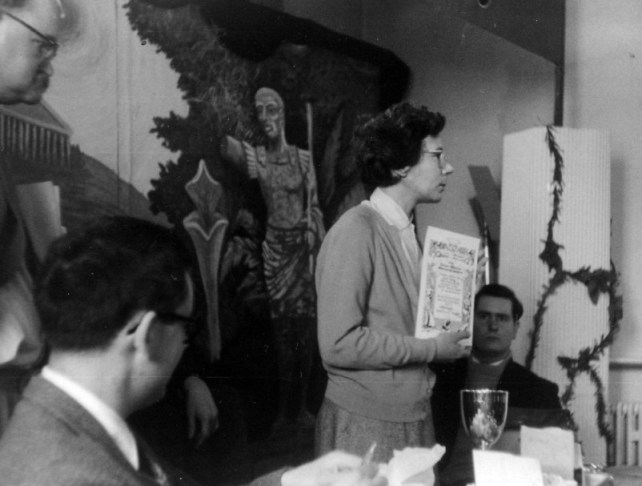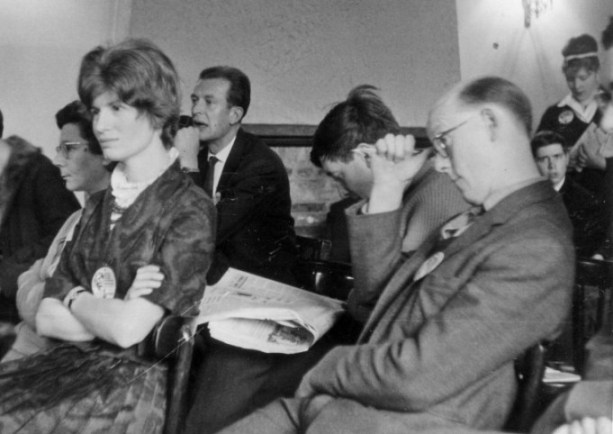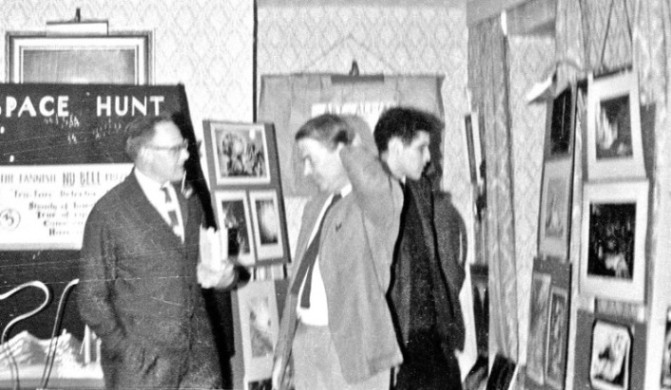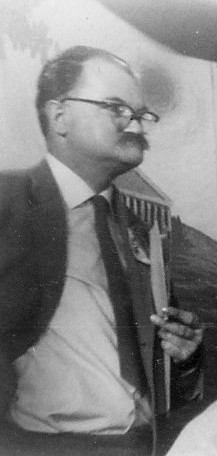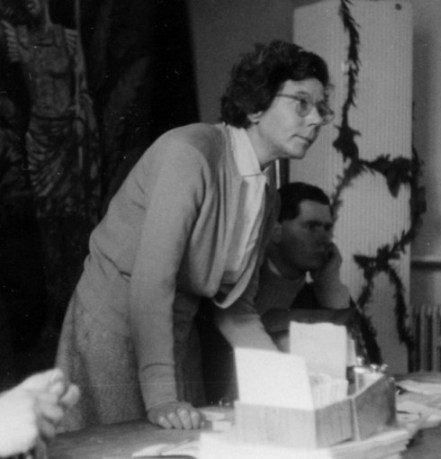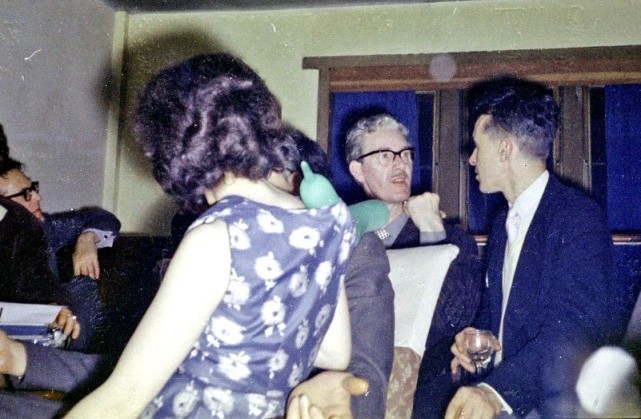Sunday April 14thBRIAN ALDISS:For Sunday breakfast we had double coffees all round. It took some while for service was so slow it became retrograde at times, but John Brunner was being unreasonably witty and we were naturally all cheered to find that the Sunday Telegraph printed not one word of Miss Heather Nichoison's report. As always, it was amusing to see others stagger in and assay bacon and eggs; some of them looked as if they had been up all night, performing eye operations on each other. Ted Carnell and I had a long, serious chat on future plans. Delayed-service breakfast meant we missed Ethel's TAFF talk, but we had bought her report. Margaret and I sat talking to two of the most charming people at the Convention, Betty and Mike Rosenblum. Throughout the Con, Betty looked as if she was freshly dressed from her bath and about to spend an afternoon on the beach. I haven't your keen eye for sartorial detail, James, but I noticed Mike was also smartly dressed. Even Betty's fountain pen was elegant. When she lent it to me to sign a book, she said it would be hallowed from then on; I assured her I liked it so much it was nearly good-byed instead. Before we left, to show they'd forgiven the pun, Mike presented me with a set of his fanzine, THE NEW FUTURIAN. It's so readable I'm forging through it before embarking on the great pile of paperbacks I bought.
BRIAN VARLEY: Sunday morning we missed breakfast and also the heavy traffic noises of the previous day. Still we were all present and correct when Ethel opened the programme with her TAFF talk supported by Ron Bennett and Eric Bentcliffe. The three TAFFers were almost inundated by a brag-school set up by Phil Rogers on their table, the rest of the space being taken up by the Lindsay tea-tray. The session began some fifteen minutes late, in front of a surprisingly good audience, with Ethel giving a resume of the history and purpose of TAFF and outlining ambitions for the future.
Being very controversial for such an early hour Ted Tubb proposed that the administration should consider amending the voting system by allowing fans to buy more than one vote, paid for by doubling up so that, in effect, one vote would cost 2/6d, two 5/- and three 7/6 etc. After a heated discussion a vote was taken and only three hands were shown against this proposal being considered. A motion was also passed proposing that the voting subscription should be doubled to 5/- whether or not the Americans doubled their contributions.
Archie Mercer was then invited to the table to put forward a proposal. Firstly Archie stressed that he was not anti-TAFF, but rather, against open elections. He reasoned that in one year it was possible to have two excellent candidates competing against each other, yet in the following year have two second-rate contestants. The results were obvious to all as was the risk of bad feelings between the nominees. He therefore proposed that a panel of selectors be set up, consisting of three fans-in-good-standing, plus the last two trippers. This panel would select the most deserving fan to benefit from TAFF.
The proposal was discussed and eventually defeated, mainly on the grounds that a) a pressure group could still work on the panel and b) the voting and the contest brought in the cash. Ken Slater, worried at the delay in the programme interrupted the proceedings with a proposal that the present system, which apparently had the support of most fans, should be retained. This proposal was passed and the meeting closed by Madam Chairman. Next in line was the BSFA AGM. Having had enough of earnest discussion we retired to the lounge for a long-awaited pot of tea, but rallied ourselves sufficiently to creep back for the closing minutes. RON BENNETT: Chairman Terry Jeeves outlined the schemes inaugurated during the year and mentioned that VECTOR, the official journal, hoped to go on to printed covers shortly. It had been a year of "solid slog," he said, mentioning the year's crises when Association Editor Ella Parker had to give up her post and when the BSFA Library had had to be moved to Liverpool. Round-robin letters were being started and there was a scheme in hand for encouraging aspiring writers. Chris Miller asked how new members were being recruited and Brian Aldiss muttered "thumbscrew." Peterborough was voted in as next year's convention site and next year's BSFA Committee was decided upon, as follows: Chairman - Phil Rogers. Vice-chairman - office jointly held by Bobbie Gray & Tony Walsh. Secretary - Maxim Jakubowski. Treasurer - Jill Adams keeps her post. Publications Officers - Archie Mercer & Michael Rosenblum. BRIAN ALDISS: Most of the morning was occupied with the BSFA AGM. It was like all AGMs, and Bobbie Gray showed great resource in pushing it through as she did, though her opening remarks about "Discussing our usual crises" struck a chill note. It was revealed that half the BSFA membership does not renew, although it is in fact increasing its numbers. This is not the place to go into details of that meeting, but personally I felt that we have secured a very good joe in the person of our new book librarian, Joe Navin.
Amid a gale of amazement, we were told that the Bull management would have us back next year. Taurus saw us, bore us, encored us! Owing to ill-health, Bobbie is unable to act as BSFA Chairman, while for the same reason Terry Jeeves cannot chair again Phil Rogers was put up for the job.
"But I don't know what the job entails!" Phil exclaimed. I was chosen to be Chairman for the '65 World Con; Ella tells me it entails nothing, but I admit my hand isn't quite steady. ARCHIE MERCER: Prominent amongst this year's emergency absentees were ex-Librarian Peter Mabey and Treasurer Jill Adams, both of whom had to stay away for personal reasons. In Peter's case it was particularly unfortunate, because it turned out that he was voted to be the first recipient of the Doc Weir Award - an award he richly deserves for his services to the Library over at least four years besides other general service to the Association, to the Cheltenham S.F. Circle, and to fandom as a whole. Arrangements are being made to present him with the regalia in London (where he now lives). Jill's absence was occasioned by her small daughter Penelope, who came out in spots at just the wrong moment. I know some people claim they can't afford to visit Conventions (even though they're not all that expensive), but this is the first time I've ever heard of anybody having to miss one just because of one measly Penny.
BRIAN VARLEY: Silence fell as Ken Slater got up to announce the Doc Weir Award for this the first year and tumultuous applause greeted the announcement that Peter Mabey was the winner. A well-deserved award for one of the busiest backroom boys of fandom. Peter was unable to attend, and the job of passing him the handsome trophy was given to SFCoL who promised to make a ceremonial presentation. This is, perhaps, an appropriate moment to mention the Art Awards. The Best Colourwork and SFCoL Special Award went to Jack Wilson. Jeeves took the Cartoon Award. Marc Ashby's Conhall backdrop was highly commended by the judges which, in their opinion contributed greatly to the success of the convention. After lunch Geoff Doherty gave his talk "New Lamps for Old". Unfortunately with the programme running late, this had to be drastically cut and so, what turned out to be one of the highspots of the programme, was reduced to a miserable half-hour. BRIAN ALDISS: With the Yarboroughs and Mack Reynolds, we ate in the hotel. That was the time when the wine waiter refused to chill the Reisling. It was during that protracted battle that Geoff Doherty, still resolutely talking about sf, announced that one Northern England Examination board was now setting A Level questions on sf. He said, and I scribbled his immortal words down at once, "The winds of change are blowing even down the stuffy corridors of the academic world." I wish I'd said that. Geoff excelled himself later in his talk on "SF: New Lamps for Old". He spoke very forcefully, and said that what we identify as an sf feeling has been felt often before, not least by poets. He illustrated the point by quoting from Browning's "Childe Roland to the Dark Tower Came":
'What bad use was that engine for, that wheel, Even Milton, he said, is to some extent an sf writer, in that he presents a view of man in a system, although it is a rigidly Christian system. And in "Paradise Lost" one often catches the echo of enchanted horns that we call the Sense of Wonder. He said that sf has something in common with many types of saga from the Icelandic down to Pilgrim's Progress - anything in fact that showed Man engaged on a journey. In short, he claimed a lot more that you or I would have the nerve to do. He denied that outside writers by writing sf, "jumped on the bandwagon". They might do it to express a different view of mankind, as Harry Martinson has done in his epic poem, Aniara. As the new views spread, so more writers will write sf; as proof of which is the growing output of hardcover sf. Geoff's was a stimulating and difficult speech. I liked it a lot, and I disagreed with much of it. Soon after it was finished, he had to phone his report of the Con to the Guardian, and then catch a train home. So he was unable to sit in on all of the Pro Panel - not that that long-suffering board was not heavily loaded enough. We did a sort of shift work on it, which was none too successful. BRIAN VARLEY: There was such an abundance of professionals around this year it had been decided to ring the changes on the panel every two or three questions. The result was nobody really was able to get warmed up, those who were making a show were unceremoniously ejected and many follow-up questions died unspoken as the speaker they were intended for left the platform. As group after group of writers trooped up to the platform the listeners slowly began to filter away. As one writer fumbled his way through a semantic barrier, trying to express his thoughts a voice murmured in my ear "More cock from Moorcock.". This may well have been true, but certainly wasn't fair. Many of the experts were tongue-tied, inarticulate or just inaudible. There seems to be a mistaken view that because a man can write adequately he can also express himself on the public platform. That this is not so was unquestionably proved by the majority of the panellists. Future programme organisers might care to take this to heart and select only one panel chosen, if possible, for their gift of the gab, but in any case it would allow them to get warmed up to the job, The panel should be there to entertain the audience, not pander to every professional ego. Mind you it is only fair to say that many of the questions asked were not conductive of sparkling wit and so, in part, the audience were to blame.
BRIAN ALDISS: Ella asked: the first bunch of pros what we would write if not sf. Brunner said historical novels, Aldiss sex novels, Moorcock books on mountain climbing although (or because?) he had never climbed a mountain, Geoff sex plays. Max - my notes tell me - asked what we would write if we could write what we pleased. Brunner said that would change from week to week. Aldiss said he would go back in a time machine to before H. G. Wells and write *all* the science fiction. Moorcock said he would go ahead and write as he was in any case planning to do. Doherty said he would write sf as social satire. Chris Miller asked what the panel thought about sequels. Harrison said Edgar Rice Burroughs was the only man to make a real success of it. Aldiss began "For those in peril on the sequel - " and was thrown off the panel. Kingsley Amis said authors should be paid as much as possible. In answer to a question from Betty Rosenblum, passing through the hall on her way to the beach, Bruce and Amis discussed a novel called "Time's Ruin", which the former liked and the latter didn't. Very few other people seemed to have seen a copy; if you have a spare in your library, James, I gather Bruce would pay generously for it. In answer to a question from Brunner, who by this time had been demoted to the floor, Bruce said that the first story. ever to give him the true sf kick was Sheriff's "The Hopkin's Manuscript", also known as "Cataclysm." Amis had forgotten the title of his first kicker, but it featured an awful monster who engulfed things; people eating meat pies-in the audience blushed. Dan Morgan recalled Verne's "Journey to the Centre of the Earth" and Asimov's "Foundation" series. Harrison said that one afternoon when he was seven he found an sf mag which featured a story about a guy who discovered in the Antarctic a lost civilisation founded by intellectual tyrannosauri; the cover was by Paul. The Pro Panel went on for a long while, everyone taking turn and turn about. Your reporter reports that he sneaked away and took turn and 'turn about with a bottle of whisky in the Harrison suite. There, a hilarious session developed, with Kingsley, Bruce, Harry, and Kingsley's friend Bill producing a series of superbly outre jokes. BRIAN VARLEY: Following the Pro-panel was Eric Bentcliffe's GAFIA SHOW consisting of colour slides showing scenes from Liverpool fan-life and shots taken during Eric's TAFF-trip, including the fancy dress ball and fangroups. These were padded out with holiday snaps of Rumania and Venice which were of no fannish interest but which provoked a deal of worthwhile audience participation. This isn't by any means the ideal Con slide-show. What I wonder, happens to all the film exposed at conventions? Presumably it disappears into private archives, but surely these could, and should, be collected and presented at the succeeding convention.
BRIAN VARLEY: The finale was the traditional film show consisting, this year, of Jean Cocteau's "Orphee" and Fritz Lang's "Metropolis". There is a convention in Anglofandom to groan whenever "Metropolis" is mentioned, but in actual fact it was in 1951 that the film was last shown. Not many of these present were around in fandom in 1951 as was soon proved by the incredulous joy with which the majority of the audience greeted it. The film was actually made in Germany in 1926 and some of the scenes, especially that of the flood, are remarkable even by today's standards. However, the overacting of the silent era induced audience participation and slowly the hilarity grew until devastating shafts flew from all sides. The identification of one burly bearded character with Archie Mercer was the source of much humour, the pity being that Archie himself was not present. The film ended in a tumult of laughter and there was a general agreement that this was one of the brightest items of the whole convention. There would seem to be a lot in favour of producing another silent epic for next year, for example the 1919 version of 'The Cabinet of Dr Caligari".
ARCHIE MERCER: The postponed after-hours unfinished business meeting was an experience unique in my recollection, and an object lesson in sheer cussed persistence. The main business left unfinished from that morning was the question of who would run next year's Con. We had a site - same place as this year's. We had certain offers of specific assistance - including one from Ken Slater, who could not have been blamed in the least if he'd insisted on a year's complete relaxation after all the work he's put into this one. But so far nobody had come foward to accept responsibility for general coordination, which those with experience agreed was the king-pin of the whole setup.
The meeting was, in effect, chaired jointly by Ken Slater and Bobbie Gray - Ken because he was this year's Con Chairman, and Bobbie because she'd been conducting the BSFA business meeting. It started half an hour later than scheduled (people were eating) and gradually snowballed as more and more fans crowded into the little lounge, many of them quitting 'Orphee' (which, though I didn't see any of it myself, I understand called for considerable devotion to fandom on the part of those leaving it) in order to be in on the deliberations. And we argued and we argued and we argued. We argued round in circles, in fact. Somebody would say something, suggest somebody's name perhaps, or ask a question. The suggestee would decline "on the grounds that...", or the question would be answered, Ken or Bobbie would complete the circular argument and start again in the same place as before. More suggestions. More regretful refusals. More questions. And somehow the shape of the circle would subtly shift, as Ken (or Bobbie) started the argument again - from (if it were possible) a slightly different side of the same place. And suddenly the circle was broken. Some subtle shift in the formula some illumination sparked by a casual but pointed interjection from somebody, had left open a way out of the circle. And Tony Walsh - may much egoboo accrue to his name - had agreed to accept the job. If he hadn't, I think we could easily have been there all night. I understand they elect Popes the same way. But I'm damned if I can remember a word that was said - or by who. RON BENNETT: At an extra-ordinary business meeting on the Sunday evening in the Wakeford Lounge a goodly proportion of the attendees gathered to discuss plans for holding next year's convention in Peterborough. Ken Slater pointed out that he could not afford the time away from his business to put on next year's convention but was willing to take charge of professional displays. George Locke said that he would be willing to produce the convention's newsletters and Ken Slater said that he would also be willing to look after the hotel bookings. At the end of the meeting Ethel Lindsay staggered out to find herself in charge of the 1964 programme. She was supported (yes, held up) by Tony Walsh who looked shaken himself - he will wake up to find himself Convention Chairman, Secretary and Treasurer, a formidable combination. Peter West offered to provide and put on the films and is asking anyone to suggest titles of both professional and/or amateur SF films they would like to see next year. How about The Trouble With Harry, Peter? BRIAN VARLEY: After the film, which finished shortly after midnight, there was a small gathering in 258. A dozen or so fans spread comfortably over chairs, beds or floor, a drink in hand, good conversation and a pleasant atmosphere made it a joy to be there. We learnt the Aldiss method for finding plots and this is now available to aspiring writers, price ten shillings, and will be forwarded under a plain brown cover. We would also like to offer Mack Reynold's method but he was too busy trying to persuade someone to play with his toes. Tom Boardman was holding forth on the publishing life in general and the peculiar habits of certain writers in particular. John Brunner was holding forth... Altogether a very pleasant evening and a most enjoyable end to the convention. There is an opinion, widely held, that all parties should be open to all comers, and there is much to be said for the spirit behind this. Personally though I can only truly enjoy a party if there is room to breathe and move in. I attended both parties in 258 and must say that the Sunday evening "closed" session was infinitely more preferable... but then I am speaking from the inside. BRIAN ALDISS: And so the Sunday wore delectably on. Kingsley returned to Cambridge by taxi, most of the rest of us - and that makes about 169 - saw one or both of the two films, "Metropolis", and Cocteau's "Orphee". The latter has most powerful symbols of death and the unknown, but the former was the more popular; in the immortal words of Skyrack, "There were many impromptu remarks from the audience". So the gaiety went on unabated. When Tom and Joyce Boardman dragged Margaret goggle-eyed from "Metropolis", we went and had a drink in the notorious Room Five, where the Brunner's massive dog was just finishing the remains of a delicious fan. Serious discussions then took place, on the subject of whether world conditions had not seriously deteriorated since women were given the vote. On the bed John Brunner and Bruce were entertaining Margaret and Joan Harrison with the exploits of Feghoot. I sold one of my oil paintings to Bruce for an undisclosed sum. Eric Bentcliffe suggested that since people got tired, all-night parties should in future be held during the afternoon.
At an undisclosed time of night, Tom Boardman and I decided we should visit Ella and. Ethel in room 258. Unfortunately they were not alone, and the room was full of Jimmy Groves, to mention but a few. The talk there was more intellectual than in the pro room, and we discussed some of the points raised in the speech of Danish fan Harrison (whose cry "Elsinore in '64" had not been taken up). This was a very nice party, and I managed to get on to a bed with Frances Varley; Brian Varley was also there. They voted that I had the best red socks of the Convention, which was some sort of consolation. Eventually Tom and I left; the party was still going strong, and Ethel lay fast asleep on her bed. We went to look up the Harrisons, and found Joan in bed. Margaret joined us, and the five of us had a quiet little session on Joan's bed. It had to be quiet - the children snoozed only a few feet away. The tremendously high level of the discussion deteriorated after a while, notably when I could no longer resist a slice of midriff Joan kept on showing. I pressed a passionate signature to it with my ball-point pen. So Harry got to signing Tom with a sharp-pointed Parker '51. Having been signed and resigned, we resigned from the party, and tottered off to bed. Even the jolly sound of a corridor con upstairs could not lure us, though Tom went. We heard later that Mike Moorcock had been composing a new Elric story, with additions by various hands and censorship by Ted Carnell. Tom bought the result, all rights, for a penny. Last I saw of Mike and Ted, Ted was trying to get his ten per cent.... LANGDON JONES: I wandered upstairs, and walked round the hotel talking and lounging about. I finally wandered into Mike Moorcock's party. Mike was quite worried as I had paid him some money for booze, and then hadn't turned up to drink it. However I got as much of my money's worth as I could. Later I wandered out into the corridor and found a party going full-swing there too, at the top of the stairs. I remember passing Ted Tubb as he was reading the palm of Gerry Webb's girl and saying, "Ah yes, you are a woman of tempestuous passion..." and the girl looking up at him, drinking in every word. For some reason things began to get a little blurry. I remember collaring a bottle from somewhere, goodness knows where. Max Jakubowski was sitting at a typewriter, staring at a sheet of paper containing the words THE SHAVEN SUN. Mighod, thought I, what a wonderful title, I eventually persuaded him to let me type out the story, I got very engrossed in this epic, and just remember being infuriated by some woman called Ina Shorrock, who kept saying, "Ooh, we haven't got one of those on our typewriter..." and pressing all the available keys. Still, I unintentionally got my own back by confusing her with Inchmery. At last I perfected the epic to my own exacting satisfaction, and cried, "Look everybody!" There was silence. I looked up, and found that I was completely on my own, I picked up the typer and staggered downstairs to the lounge. There I found Mike Moorcock, Max Jakubowski, Ron Bennett and Ted Tubb. I gave the typer back, and collapsed into an armchair, I looked at the window, through which the light of dawn was greyly shining, and I thought with satisfaction, "well, at least I'll get breakfast tomorrow." There followed a drunken (at least on my part) conversation on the merits of Bradbury. Suddenly my memory of the conversation cuts off completely. I was manhandled into wakefulness by Ella Parker. The lounge was full of light, and people, I looked desperately at my watch. The time was 10.30 am.
| |||||||||||||
|
